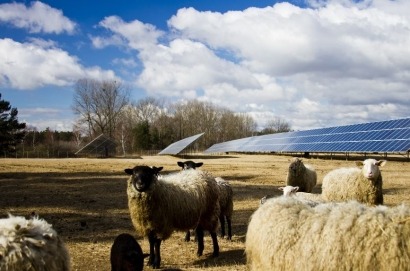
This growing interest in solar energy presents an attractive income stream for farmers, with most solar plant developers wanting a 25 year lease on the land they use. Importantly, the development of a solar plant on low grade farmland, such as fields solely for grazing, does not necessarily mean the land is lost to farming.
In fact most solar developers will consider allowing the fields to be used for grazing provided that they have the ability to stop the grazing should the solar plant suffer damage.
In our experience, whilst grazing obviously keeps grass growth under control, it generally rules out goats, as their penchant for eating just about anything, including the sheathing on electricity cables is well documented.
Solar plant developers have been encouraged by recent planning guidance for renewable and low carbon energy, with many foreign companies looking to expand their operations in the UK. The Department for Communities and Local Government has made it clear, that when assessing a planning application for a solar plant on farmland, local authorities should consider whether the application allows for continued agricultural use and/or encourages biodiversity improvements around solar arrays.
So far it all sounds good for land owners, but one issue that has not attracted much attention is the potential inheritance tax implications for farmers who are intending to allow a solar plant to be built on their land.
Inheritance tax is payable on an estate when someone dies provided that the estate exceeds a certain threshold (£325,000 in 2013-14). A farm will be included in a person’s estate for inheritance tax purposes; however, agricultural property relief will apply to agricultural property which forms part of a working farm.
This raises an interesting question; does leasing land for a solar plant mean that the relevant fields are no longer eligible for agricultural property relief?
Unfortunately, like many facets of English law, the answer is not entirely clear.
The grant of a lease will not in itself cause the relief to be lost, but it is necessary for the land to continue to be used for agriculture. It is arguable that, if the lease is granted to the solar plant developer and the land is licensed back to the farmer for grazing, this would be sufficient for relief to continue to apply. However, this cannot be said with certainty.
One possibility we have explored is for a company to be established and for the whole farm to be transferred to this company. In this case, the farmer’s interest in the land would be converted to an interest in shares which, for inheritance tax purposes, should be entitled to business relief. It would not be advisable however, for the transfer to take place solely in relation to the fields on which the solar farm was to be developed, as business relief does not apply if the main business of the company is to hold land.
This issue highlights the importance of considering the availability of agricultural property relief in the round and the overall farming enterprises undertaken. Land owners should seek expert advice on the matter to ensure the benefits of the relationship are truly symbiotic and not just assume the developer is offering a ‘fit and forget’ income stream for 25 years.
For additional information:
SGH Martineau is a corporate commercial law firm operating from offices in London, Birmingham and Brussels. Neil Budd qualified as a solicitor in 1988 and began working as an energy lawyer in 1999. He has specialized in renewable energy since 2005.
In that regard, Budd has undertaken a range of solar projects, recently advising a European funder on the equity financing of three solar PV projects in south-west England. His involvement included project due diligence on site acquisition, planning and grid connection and negotiating EPC and O&M contracts.

